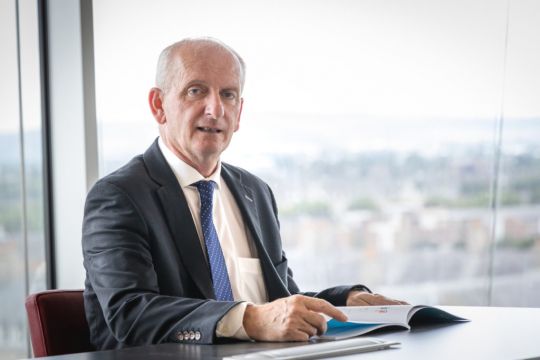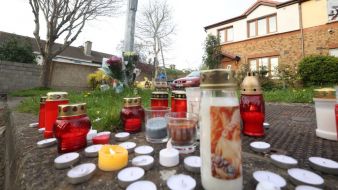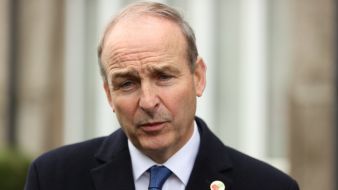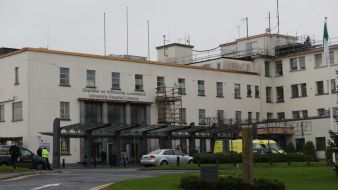The new chief executive of the HSE has said he does not have a “magic wand” to address the delivery of additional beds beyond what has already been approved.
Appearing before the Joint Committee on Health to discuss his priorities in the role, Bernard Gloster said the HSE was delivering the balance of 200 out of 1,228 acute inpatient beds planned for 2021 and 2022.
“There isn’t much point in me asking for more if I’m not able to show a form in being able to deliver what I’ve been given,” he said.
Sinn Féin health spokesperson David Cullinane was critical of the acquisition of bed capacity throughout HSE winter plans.
Mr Gloster said: “I will never shy away from asking for additional approval for capacity.”
However, he said there was a need to deliver the approximately 200 beds that have been approved for this year before asking for more.
Mr Cullinane said people were waiting too long in emergency departments, and it would be a “failure” if more beds were not delivered beyond that this year.
Mr Gloster replied: “I don’t have a magic wand, deputy.”
Fine Gael senator Sean Kyne also raised concerns over capacity issues during winter.
Mr Gloster said “winter plans” have passed their usefulness and that capacity pressures exist throughout the year.
“The acute hospital system is operating at full tilt,” he said.
He said it was his intention to have an “all year round capacity plan” by 2024 or sooner.
Mr Gloster, who was appointed earlier this month, told the committee there was now an opportunity to make “substantial improvements” to the HSE in areas such as access and performance, timely implementation and public confidence.
He was asked by committee members about plans for delivering devolved regional health areas (RHAs).
Mr Gloster said there are many challenges in reforming the HSE’s “top-heavy structure” and “many cumbersome processes”.
“The organisation requires attention and significant step change on several fronts in responding to these challenges,” he said.
Mr Cullinane asked what the first step would be to deliver RHAs.
Mr Gloster, who is the former head of the Child and Family Agency Tusla, said he would achieve “fundamental step change” if there were six regional leaders in place for the start of 2022, but there were factors outside his control in terms of approval by the Department of Health and Department of Public Expenditure and Reform.
However, he said before April 4th he will be “changing entirely” management processes by bringing current regional hospital chief executives together for a meeting he would chair.
Social Democrat Roisin Shortall said Mr Gloster’s main job is to devolve power and responsibility away from the central HSE and himself.
“The centre is just too top-heavy and part of that is about in the shift of the balance of decision-making to a regional level,” Mr Gloster said.
Mr Gloster said he had experience in restructuring Tusla into six regions along with a smaller centre.
He said there was a need to be careful that there is consistency across the six regions.
He accepted there was a “significant way to go” in clarifying and implementing appropriate accountability measures.
Ms Shortall asked if he would reinstate a national director for mental health.
Mr Gloster said mental health and disability issues require serious attention at every level but the difficulty with appointing a national director was it would take that out of the integrated system of RHAs.
He said there would, however, be a dedicated focus on mental health and disability in the central HSE structure.
“A fundamental part of that change has to be (to) deal with the centre of the HSE, not just the size of it, but its purpose and function.”
He said a lot of the decision-making has understandably been centralised and the centre has grown into a “significant, top-heavy” system.
He said he has tried to rebalance that for more regional decision-making.
Asked by Mr Cullinane about how he would avert strike action over unsafe staffing levels, Mr Gloster said he had “very good engagement” with the Irish Nurses and Midwives Organisation (INMO).
Mr Gloster said that would be achieved “through an honest and fair dialogue that calls out what are the challenges that the INMO have laid out”.
He said he would be “completely” hands-on in attempting to improve conditions for staff members, including in supporting them on issues relating to the violence, harassment and aggression they face.
“I don’t dispute that we need to pay attention constantly to a safe and appropriate environment for patients,” Mr Gloster said.
Mr Cullinane said workforce planning should be a key priority for the HSE.
Mr Gloster said there was work to grow the number of training places “quite significantly”.
He also told deputies he is examining ways to reduce timelines on implementing significant capital expenditure.







